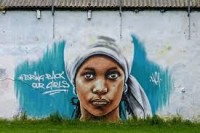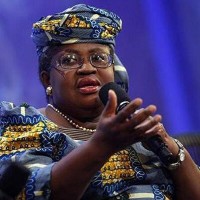You have no items in your cart. Want to get some nice things?
Go shopping
In April 2014, Boko Haram abducted over 200 school girls from the city of Chibok in northern Nigeria, ferrying them off to unknown destinations. There was no official outcry from the government of Nigeria until #BringBackourGirls , a plea asking for the girls to be released, became a trending hashtag on social media (and gained international attention with everyone from Michelle Obama to Malala using it).
 #BringBackourGirls, a plea asking for the girls to be released, became a trending hashtag on social media.
#BringBackourGirls, a plea asking for the girls to be released, became a trending hashtag on social media.
And when the government did release an official statement, it was to question the veracity of the story (did the girls really disappear?) and to dispute the number of girls missing. The day after the Chibok attack, the president went on a political rally. It took him until July (100 days after the fact) to meet with the parents of the victims and to assure them that their daughters would be found. Till date, the only girls that have been “found” are those who managed to escape themselves. With elections around the corner (February 15, 2015), President Goodluck has resurrected the “Chibok Girls” issue, long forgotten by his cabinet, promising to find and bring them home. No one believes him.
There have been several Boko Haram attacks since the Chibok one (mostly limited to northern Nigeria) the deadliest (so far) occurred on Thursday, January 8, 2015 in Baga, Borno State, in a raid that started on January 3, in which several villages around Baga were invaded. Over 2000 people were killed. If President Jonathan’s response to Chibok was slow, his response to Baga has been- so far- non-existent. The president is busy campaigning for re-election. The presidential elections are, after all, a few weeks away. Besides, according to Doyin Okupe, Jonathan’s media aide, the Boga casualty numbers are “exaggerated.” And as has become the norm for this government, the attack is being blamed on unnamed political opponents of Goodluck Jonathan.
On January 7, in the midst of the attacks around Baga, and the day before the town was raided, the office of the French satirical magazine, Charlie Hebdo was attacked by 3 gunmen. 12 cartoonists were killed. The Paris attacks sparked off international outrage. On twitter, #JesuisCharlie trended. Nigeria’s top leaders fell over themselves to show their solidarity with France.
 Okonjo-Iweala, minister for Finance, was proudly updating her twitter status with #CharlieHebdo. She tweeted on the 8th Jan,Terrible incident. Our deepest sympathies to the journalists and their families. We are one with France in mourning #JeSuisCharlie.
Okonjo-Iweala, minister for Finance, was proudly updating her twitter status with #CharlieHebdo. She tweeted on the 8th Jan,Terrible incident. Our deepest sympathies to the journalists and their families. We are one with France in mourning #JeSuisCharlie.
President Goodluck Jonathan went on TV and condoled in real time with his French colleagues, condemning in very strong terms the barbaric attack on human lives. Yet, the same government leaders who denounced the Charlie Hebdo attack have remained distressingly silent on events in Nigeria.. They were quick to be #CharlieHebdo. Not so quick to be #Baga . They are silent on the bomb explosion in a market in Maiduguri, Borno state’s capital, about 200 km from Baga, in which 19 people died. The suicide bomber was a 10 year old girl. They are silent on the suicide bombing of a market in Damaturu, Yobe State, on Sunday, January 12 in which 3 people died. The suicide bombers were young girls. They are silent on the most recent attacks in Maiduguri. Worryingly, on social media, there are non-northern Nigerians who updated their status’ to show their solidarity with France, who were (rightfully) morally outraged by the blatant act of terror but who argue that Boko Haram “is northerners killing each other” and is therefore none of their business. They are not alarmed by the fact that this is escalating, that young girls are being recruited/forced to carry out attacks against people in their communities, that victims are fellow Nigerians.
While 50 world leaders joined an estimated 1 million to march in Paris on Sunday, in a show of solidarity with and in honour of the 17 victims, while international media focused on the Paris massacre the 2000 victims of the Baga massacre seem to have been mostly forgotten, already relegated to the footnote of history as if their lives did not matter. It seems, many observers have noted on social media and elsewhere, that some lives are more equal than others.
He who treats his mother’s corpse like a log of wood is inviting others to chop it for fire. The International community is taking its lead from the nation itself. If the Nigerian government treats the atrocities visited on its own beleaguered people like a minor inconvenience- perhaps not much more inconveniencing than suffering from diarrhea at an office party, then perhaps it is no wonder that the outrage from the rest of the world is muted, that nobody is marching for Baga, that at the GoldenGlobes, “JeSuisCharlie” was visible whereas Baga was nowhere to be seen.
If you treat your house like a public toilet, do not be surprised that others use it as such.

About Chika Unigwe
Chika Unigwe is a Nigerian writer. She is the author of fiction, poetry, articles and educational material. Her latest novel, Night Dancer, was published in Dutch in 2011 (as Nachtdanser) and in English in 2012




